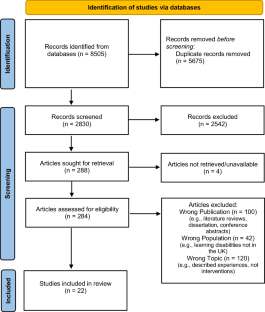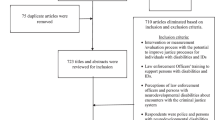Interventions for Persons with Intellectual/Developmental Disabilities Involved with the Criminal Justice System: a Scoping Review

Persons with intellectual/developmental disabilities (IDD) experience barriers in the criminal justice system. It is important that appropriate accommodations are available and justice professionals receive training to ensure these accommodations occur. This scoping review summarizes recent peer-reviewed publications investigating models of accommodation and support for persons with IDD in the criminal justice system.
Recent Findings
A total of 22 studies met all the eligibility criteria. Research showed that most peer-reviewed literature focused on earlier phases in the criminal justice system, namely police contact and court proceedings. Most interventions focused on screening for IDD and providing appropriate accommodations.
Summary
Currently evaluated interventions for persons with IDD involved in the criminal justice system include screening tools for identification, diversion to specialized courts, third-person intermediaries, and modifications to existing programs and materials. Independent assessments of training for justice professionals indicate that they can be trained to recognize and accommodate persons with IDD and use screening tools and modified materials.
This is a preview of subscription content, log in via an institution to check access.
Access this article
Subscribe and save
Springer+ Basic
€32.70 /Month
- Get 10 units per month
- Download Article/Chapter or eBook
- 1 Unit = 1 Article or 1 Chapter
- Cancel anytime
Buy Now
Price includes VAT (France)
Instant access to the full article PDF.
Rent this article via DeepDyve

Similar content being viewed by others

Introduction
Chapter © 2014

Implementing Evidence-Based Practices Wisely
Chapter © 2016

A Scoping Review of Research to Assist Individuals with Intellectual and Developmental Disabilities in Interactions with Police
Article 17 January 2022
Explore related subjects
References
Papers of particular interest, published recently, have been highlighted as: • Of importance
- Crowder S & Turvey BE: Ethics in the criminal justice professions. In: B. E. Turvey & S. Crowder, editors. Ethical justice: Applied issues for criminal justice students and professionals. Toronto: Elsevier Inc.; 2013.
- Packer HL. Two models of the criminal process. U Pa L Rev. 1964;113:1. ArticleGoogle Scholar
- Brown J, Hastings B, Cooney-Koss L, Huntley D, Brasch D, Anderson G, Chukuske R, Arndt C, Trnka A, Burger P, Martindale J. Autism spectrum disorder in the criminal justice system: a review for caregivers and professionals. J Law Enforcement. 2016 Sep 1;5(5).
- Sarrett JC, Ucar A. Beliefs about and perspectives of the criminal justice system of people with intellectual and developmental disabilities: a qualitative study. Social Sci Hum Open. 2021;3(1):100122. https://doi.org/10.1016/j.ssaho.2021.100122. ArticleGoogle Scholar
- Schatz SJ. Interrogated with intellectual disabilities: the risks of false confession. Stan L Rev. 2018;70:643. Google Scholar
- Mogavero MC. Autism, sexual offending, and the criminal justice system. J Intellectual Disab Offending Behav. 2016. https://doi.org/10.1108/JIDOB-02-2016-0004. ArticleGoogle Scholar
- Crosby SD, Algood CL, Sayles B, Cubbage J. An ecological examination of factors that impact well-being among developmentally-disabled youth in the juvenile justice system. Juv Fam Court J. 2017;68(2):5–18. https://doi.org/10.1111/jfcj.12091. ArticleGoogle Scholar
- United Nations. Convention on the rights of persons with disabilities. Treaty Series. 2006;2515:3. Google Scholar
- • Collins J, Horton, K, Gale-St. Ives E, Murphy G, Barnoux, M. A systematic review of autistic people and the criminal justice system: an update of King and Murphy (2014). 2022. https://doi.org/10.1007/s10803-022-05590-3. This article is a recent knowledge synthesis regarding autistic people and the criminal justice system.
- • Sanyaolu O, Olaniyan A, NaaAkuyea Addy T, Nabors L. A scoping review of research to assist individuals with intellectual and developmental disabilities in interactions with police. Adv Neurodev Disorders. 2022;17(6):1–17. https://doi.org/10.1007/s41252-022-00240-2. This article is a recent knowledge synthesis of police interactions with persons with IDD.
- • Jones J. Persons with intellectual disabilities in the criminal justice system: review of issues. Int J Offender Ther Comp Criminol. 2007;51(6):723–33. https://doi.org/10.1177/0306624X07299343. This literature review covers issues related to persons with IDD and the criminal justice system.
- Arksey H, O’Malley L. Scoping studies: towards a methodological framework. Int J Soc Res Methodol. 2005;8(1):19–32. https://doi.org/10.1080/1364557032000119616. ArticleGoogle Scholar
- Levac D, Colquhoun H, O’Brien KK. Scoping studies: advancing the methodology. Implement Sci. 2010;5(1):1–9. https://doi.org/10.1186/1748-5908-5-69. ArticleGoogle Scholar
- Veritas Health Innovation. (2022). Covidence systematic review software. Melbourne, Australia. Retrieved from: www.covidence.org.
- Gulati G, Cusack A, Murphy V, Kelly BD, Kilcommins S, Dunne CP. The evaluation of a training course to enhance intellectual disability awareness amongst law enforcement officers: a pilot study. Irish J Psych Med. 2021;3:1–5. https://doi.org/10.1017/ipm.2021.80. ArticleGoogle Scholar
- Henshaw M, Spivak B, Thomas SD. Striking the right balance: police experience, perceptions and use of independent support persons during interviews involving people with intellectual disability. J Appl Res Intellect Disabil. 2018;31(2):e201–11. https://doi.org/10.1111/jar.12297. ArticlePubMedGoogle Scholar
- Hinkle KA, Lerman DC. Preparing law enforcement officers to engage successfully with individuals with autism spectrum disorder: an evaluation of a performance-based approach. J Autism Dev Disord. 2021;13:1–4. https://doi.org/10.1007/s10803-021-05192-5. ArticleGoogle Scholar
- Jessiman T, Cameron A. The role of the appropriate adult in supporting vulnerable adults in custody: comparing the perspectives of service users and service providers. Br J Learn Disabil. 2017;45(4):246–52. https://doi.org/10.1111/bld.12201. ArticleGoogle Scholar
- Macdonald SJ, Peacock D, Cosgrove F, Podd W. ‘The silence’: examining the missing voices of disabled people in police custody. Disability & Society. 2021;36(1):19–37. https://doi.org/10.1080/09687599.2020.1712190. ArticleGoogle Scholar
- McKinnon I, Thorp J, Grubin D. Improving the detection of detainees with suspected intellectual disability in police custody. Adv Ment Health Intellect Disabil. 2015. https://doi.org/10.1108/AMHID-04-2015-0015. ArticleGoogle Scholar
- Norris JE, Crane L, Maras K. Interviewing autistic adults: adaptations to support recall in police, employment, and healthcare interviews. Autism. 2020;24(6):1506–20. https://doi.org/10.1177/1362361320909174. ArticlePubMedPubMed CentralGoogle Scholar
- Parsons S, Sherwood G. A pilot evaluation of using symbol-based information in police custody. Br J Learn Disabil. 2016;44(3):213–24. https://doi.org/10.1111/bld.12140. ArticleGoogle Scholar
- Parsons S, Sherwood G. Vulnerability in custody: perceptions and practices of police officers and criminal justice professionals in meeting the communication needs of offenders with learning disabilities and learning difficulties. Disability & Society. 2016;31(4):553–72. https://doi.org/10.1080/09687599.2016.1181538. ArticleGoogle Scholar
- Rendall M, MacMahon K, Kidd B. The Scottish police caution: do individuals with intellectual disabilities understand a verbally presented police caution, and can comprehension be improved? Psychiatry, Psych Law. 2021;28(1):50–69. https://doi.org/10.1080/13218719.2020.1767710. ArticleGoogle Scholar
- Richards J, Milne R. Appropriate adults: their experiences and understanding of autism spectrum disorder. Res Dev Disabil. 2020;1(103):103675. https://doi.org/10.1016/j.ridd.2020.103675. ArticleGoogle Scholar
- Burke MM, Griggs M, Dykens EM, Hodapp RM. Defendants with intellectual disabilities and mental health diagnoses: faring in a mental health court. J Intellect Disabil Res. 2012;56(3):305–16. https://doi.org/10.1111/j.1365-2788.2011.01422.x. ArticleCASPubMedGoogle Scholar
- Chadwick DD, Wesson C. ‘Blocked at every level’: criminal justice system professionals’ experiences of including people with intellectual disabilities within a targeted magistrates’ court. J Intellectual Disab Offending Behav. 2020. https://doi.org/10.1108/JIDOB-07-2019-0014. ArticleGoogle Scholar
- Chaplin E, McCarthy J, Marshall-Tate K, Ali S, Xenitidis K, Childs J, Harvey D, McKinnon I, Robinson L, Hardy S, Srivastava S. Evaluation of a liaison and diversion court mental health service for defendants with neurodevelopmental disorders. Res Dev Disabil. 2021;1(119):104103. https://doi.org/10.1016/j.ridd.2021.104103. ArticleGoogle Scholar
- Linhorst DM, Loux TM, Dirks-Linhorst PA, Riley SE. Characteristics and outcomes of people with intellectual and developmental disabilities participating in a mental health court. Am J Intellect Dev Disabil. 2018;123(4):359–70. https://doi.org/10.1352/1944-7558-123.4.359. ArticlePubMedGoogle Scholar
- McCausland R, Reeve R, Gooding P. The economic case for improving legal outcomes for accused persons with cognitive disability: an Australian study. Int J Law in Context. 2019;15(4):367–89. https://doi.org/10.1017/S1744552319000338. ArticleGoogle Scholar
- Seck MM, Tsagaris GS, Rowe R. Mental health courts and adult offenders with developmental disabilities and co-occuring diagnoses. Best Pract Ment Health. 2017;13(2):30–40. Google Scholar
- Hutchison M, Hummer D, Wooditch A. A survey of existing program strategies for offenders with intellectual and developmental disabilities under correctional supervision in Pennsylvania. Probation Journal. 2013;60(1):56–72. https://doi.org/10.1177/2F0264550512470189. ArticleGoogle Scholar
- Keeling JA, Rose JL, Beech AR. Comparing sexual offender treatment efficacy: mainstream sexual offenders and sexual offenders with special needs. J Intellect Dev Disabil. 2007;32(2):117–24. https://doi.org/10.1080/13668250701402767. ArticlePubMedGoogle Scholar
- Kelly J, Collier A, Stringer J. Providing a learning disability in-reach service for young adult offenders serving a sentence of Imprisonment for Public Protection. J Learning Disab Offending Behaviour. 2012. https://doi.org/10.1108/20420921211305882. ArticleGoogle Scholar
- Murphy GH, Gardner J, Freeman MJ. Screening prisoners for intellectual disabilities in three English prisons. J Appl Res Intellect Disabil. 2017;30(1):198–204. https://doi.org/10.1111/jar.12224. ArticlePubMedGoogle Scholar
- Watkin F, Leonard G. Community reintegration of people with mental health problems or learning disabilities from prison. Learning Disability Practice. 2019 30;22(5). https://doi.org/10.7748/ldp.2019.e2009
- Griffin PA, Munetz M, Bonfine N, Kemp K. Development of the sequential intercept model. The Sequential Intercept Model And Criminal Justice: Promoting Community Alternatives For Individuals With Serious Mental Illness. 2015;27:21. ArticleGoogle Scholar
- Davis LM, Bozick R, Steele JL, Saunders J, Miles JN. Evaluating the effectiveness of correctional education: a meta-analysis of programs that provide education to incarcerated adults. Retrieved from: https://www.rand.org/pubs/research_reports/RR266.html
- Landenberger NA, Lipsey MW. The positive effects of cognitive–behavioral programs for offenders: a meta-analysis of factors associated with effective treatment. J Exp Criminol. 2005;1(4):451–76. https://doi.org/10.1007/s11292-005-3541-7. ArticleGoogle Scholar
- Eadens DM, Cranston-Gingras A, Dupoux E, Eadens DW. Police officer perspectives on intellectual disability. Policing: An Int J Police Strat Manag. 2016 Mar 21. https://doi.org/10.1108/PIJPSM-03-2015-0039
- Trofimovs J, Srasuebkul P, Trollor JN, Dowse L. Disability support and reincarceration after a first adult prison custody episode for people with intellectual disability in New South Wales Australia. J Crim. 2022;55(2):239–59. https://doi.org/10.1177/2F26338076221087461. ArticleGoogle Scholar
- Whittingham L, Durbin A, Lin E, Matheson FI, Volpe T, Dastoori P, Calzavara A, Lunsky Y, Kouyoumdjian F. The prevalence and health status of people with developmental disabilities in provincial prisons in Ontario, Canada: a retrospective cohort study. J Appl Res Intellect Disabil. 2020;33(6):1368–79. https://doi.org/10.1111/jar.12757. ArticlePubMedGoogle Scholar
- Matheson FI, Dastoori P, Whittingham L, Calzavara A, Keown LA, Durbin A, Kouyoumdjian FG, Lin E, Volpe T, Lunsky Y. Intellectual/developmental disabilities among people incarcerated in federal correctional facilities in Ontario, Canada: examining prevalence, health and correctional characteristics. J Appl Res Intellect Disabil. 2022;35(3):900–9. https://doi.org/10.1111/jar.12995. ArticlePubMedGoogle Scholar
- Chester V. People with intellectual and developmental disorders in the United Kingdom criminal justice system. East Asian Arch Psychiatry. 2018;28(4):150–8. CASPubMedGoogle Scholar
Acknowledgements
The authors would like to acknowledge the support of Dr. Voula Marinos, Brock University; Dr. Jessica Jones, Queen’s University; and Colleen MacKinnon, Brock University.
Funding
Lisa Whittingham and Courtney Bishop are supported in part by funding from the Social Sciences and Humanities Research Council (SSHRC).
Author information
Authors and Affiliations
- Department of Child and Youth Studies, Brock University, St. Catharines, ON, Canada Lisa Whittingham & JaCoya Laplante
- Department of Criminology and Justice, Ontario Tech University, Oshawa, ON, Canada Emily Cauduro
- Faculty of Social & Community Services, Durham College, Oshawa, ON, Canada Courtney Bishop
- Lisa Whittingham



